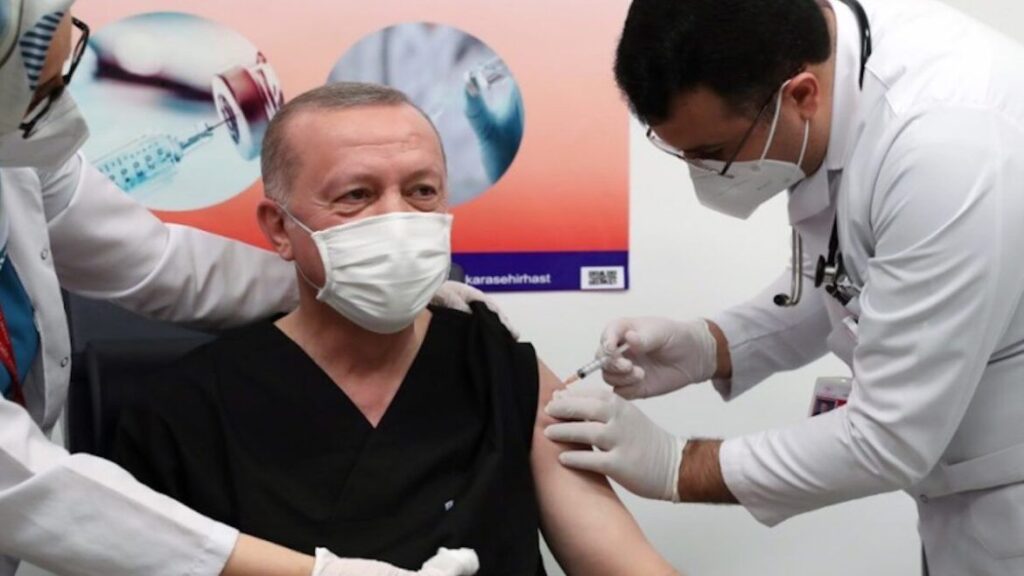As the Covid-19 pandemic continues to extract a significant human toll across various countries, China is providing vaccines under the rubric of the Health Silk Road. China reportedly exported 500 million vaccine doses to about 112 countries in the first half of this year. While combating the Covid-19 pandemic may constitute an important goal, China’s vaccine diplomacy aims to achieve four other objectives.
First, there has been considerable disappointment and even anger in some countries over China’s less than transparent handling of the Covid virus. Moreover, in the recent past, the perception that the virus may have leaked from a lab in Wuhan has gained greater credence in the international media.
In this context, through its vaccine diplomacy, China is trying to shift the contours of international discourse away from the origin of the virus to Beijing’s role in combating the pandemic. Despite Chinese efforts, research into the origins of Covid-19 continues to gain momentum.
Second, China is seeking to convey that the existing global governance frameworks and other major powers have failed to deliver the necessary vaccines to the developing world.
Last year, addressing the 73rd session of the World Health Assembly (WHA) last year, President Xi Jinping stated that “Covid-19 vaccine development and deployment in China, when available, will be made a global public good, which will be China’s contribution to ensuring vaccine accessibility and affordability in developing countries.”
Subsequently, addressing the annual conference of the Boao Forum for Asia on April 20, 2021, Xi reiterated China’s intention “to honor its commitment of making vaccines a global public good.” Through its vaccine diplomacy, China is seeking to project an image of a power that is willing to share.
Third, vaccine diplomacy has an ideological function. China’s ability to export is contingent on its ability to meet domestic requirements.
This month, Chinese media reported that about 1.4 billion doses had been administered, and the country was close to achieving “herd immunity with 50% of the population vaccinated.” Chinese media have attributed the success of the domestic vaccination program to the “strong organizing and operating capacity of Chinese governments and growing public willingness to get vaccinated.”
Since China has allegedly made rapid progress on meeting domestic requirements, its vaccine diplomacy also provides a platform to convey the efficiency of Chinese governance frameworks.
Fourth, China is using vaccine diplomacy to establish and scale up commercial relations with various countries in the pharmaceutical sector.
Enhanced presence in the global pharma market mandates greater trust in Chinese products and habits of cooperation. In this direction, China has been making efforts to get high-profile endorsements for its products.
For instance, Indonesian President Joko Widodo received two doses of Sinovac, which was reported in the Chinese media “as a vote of confidence for Chinese vaccines.”
Similarly, under the “spring sprout” program, as of early June, about “1.18 million overseas Chinese in more than 150 countries have been inoculated with Chinese or foreign vaccines.” The “spring sprout” initiative aims to generate greater trust in Chinese vaccines in other countries.
Further, toward the end of May, Xi announced that China would provide “an additional US$3 billion in international aid over the next three years to support Covid-19 response and economic and social recovery in other developing countries.” While this aid is not tied to the use of Chinese vaccines, the assistance may create frameworks of engagement that will help Chinese pharmaceutical companies in the long run.
China has also entered vaccine production agreements with countries such as the United Arab Emirates and Morocco. Further, China is also manufacturing Russian vaccines, enabling Moscow to meet its global distribution commitments. Such collaboration may acquaint Chinese firms with pharma-related production and distribution networks in various countries.
However, China’s vaccine diplomacy is also encountering a few significant challenges. For instance, The Wall Street Journal reported that the vaccines that Chinese authorities are using “aren’t as effective as the mRNA-based vaccines that are available in the West.”
There have been reports that in countries such as Bahrain, Chile, Mongolia and Seychelles, a large percentage of the population that was inoculated registered severe Covid outbreaks, which raised questions about the quality of Chinese vaccines used.
Further, there are “fresh concerns about the efficacy of Chinese vaccines” against the new Covid variants.
Some countries, such as the UAE, are experimenting with a third dose of the Chinese vaccine to boost antibodies.
While Chinese officials have often stated that vaccine prices will be “fair and reasonable,” numerous reports indicate disappointment in various countries with pricing and non-disclosure agreements.
On the other hand, there is an opinion in China that construes the above criticism as part of a vaccine war that constitutes “a comprehensive test of Chinese pharmaceutical companies and society’s ability to coordinate.”
Overall, there has been an increase in the export of Chinese pharmaceutical products. In the first four months of 2021, pharmaceutical exports totaling US$13.96 billion were registered, which represented a quantum jump compared with previous years’ exports.
All this suggests that China’s vaccine diplomacy is part of a larger strategy to create conditions for the success of the Chinese pharmaceutical industry in the global market. For countries such as India, with pharmaceutical exports constituting a critical component of their overall trade, Chinese attempts to emerge as a significant pharma player on the global market merits close attention.
Indian pharma, which thus far had to contend with non-tariff barriers for its products in China, will now compete with Chinese firms in the global market.
